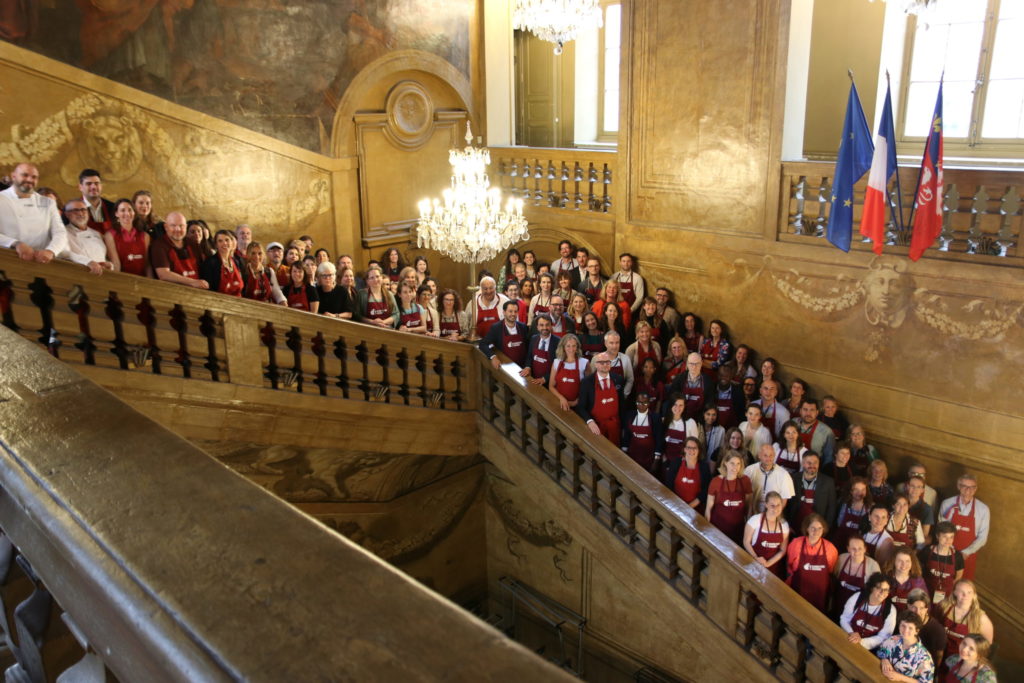Between June 4–6, 2025, the SchoolFood4Change team gathered in Lyon, France—renowned as the World Capital of Gastronomy—for the project’s 4th General Assembly. Together with invited guests, more than 100 delegates took part in the three-day event, including local policymakers, nutrition experts, cooks, researchers, and educators from across the globe.
The gathering served both as a moment to reflect on past achievements as well as a launchpad for new ambitions. Lyon’s rich culinary heritage offered the perfect scenery for bold conversations around food, health, and sustainability. After five years of dedicated work, the project has reached impressive milestones: 89 Canteen Days have been organized, drawing over 16,000 participants; more than 6,000 cooks have been trained; and a remarkable 852,345 people have been directly reached through educational efforts, healthier school meals, and a broad range of impactful activities. But let’s rewind for a moment—here’s how our SF4C General Assembly unfolded.
A Deep Dive into Policies, People, and Practices
Day One
The first day of the General Assembly centered on SchoolFood4Change’s Triple Approach, exploring its three core pillars: sustainable food procurement, healthy diets, and the Whole School Food Approach. City partners shared their achievements in leveraging public procurement to make school food systems more sustainable. Discussions highlighted how integrating food education, improved cooking practices, and sustainable menus in schools can drive meaningful behavioural change within school communities.
For instance, the city of Nuoro has taken bold steps toward transforming its local food system. In March 2023, it launched a pioneering market consultation to explore the potential of the Sardinian local market. As a result, Nuoro secured a new school catering contract worth €4.3 million, increasing the share of organic products from just 13% in 2022 to 75%, including 100% locally sourced organic olive oil. The initiative also introduced an active anti-food waste policy supported by data tracking, significantly reduced beef usage to lower environmental impact, and established small decentralized cooking centers. Nuoro’s long-term vision is to offer school meals made entirely from organic and traditional Sardinian products.
Budapest has also embraced procurement as a tool for change. As part of one district’s “Sustainable School Meals Strategy,” the city launched a green tender project in collaboration with nine districts. Following a feasibility study and market consultation, the tender was published in May, with implementation planned for November. The project’s technical features include a buffet-style service, a new salad bar, and a feedback system to monitor meal quality and service. Award criteria place a strong emphasis on increasing the use of vegetables, fruits, and whole grains beyond existing public catering requirements—an effort to support healthier and more sustainable diets in schools.
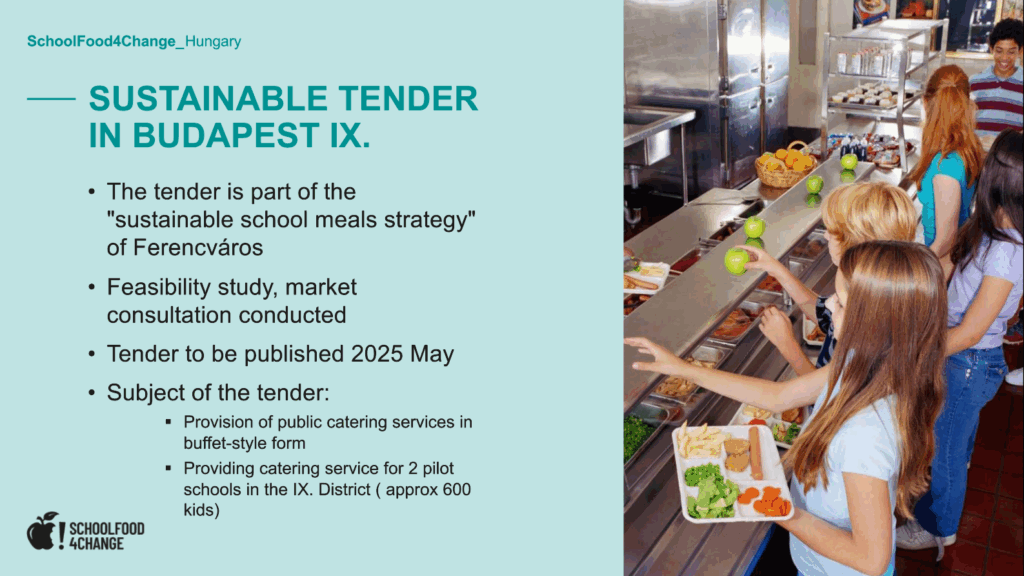
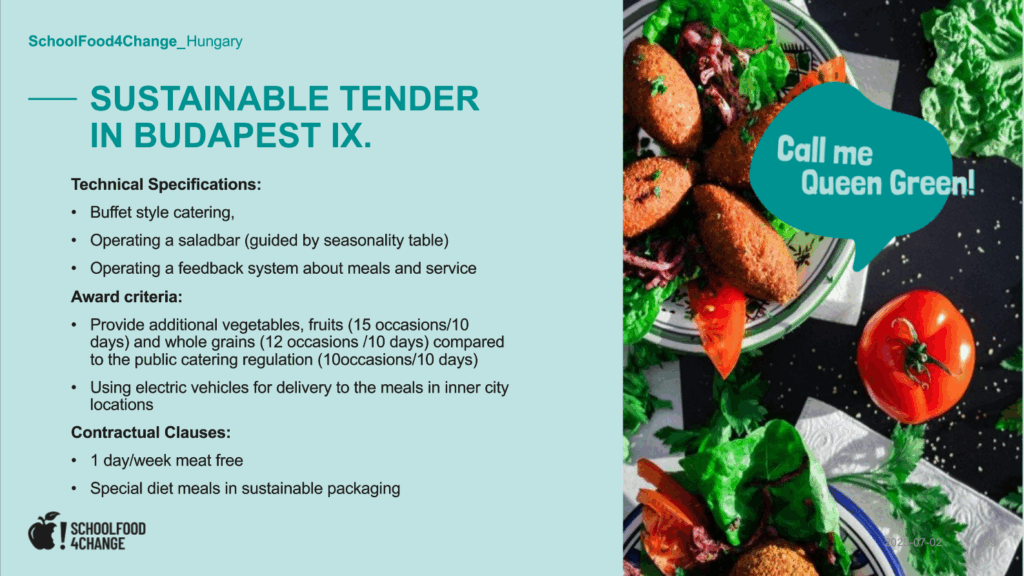
In the afternoon, the Mayor of Lyon, Gregory Douchet, and Felipe Garcia, President of the Food Capitals by Delice Network, welcomed participants with warmth, reaffirming Lyon’s strong commitment to sustainable food systems and setting the tone for a collaborative assembly. Subsequently, SF4C partners were invited to attend a high-level roundtable discussion on the topic of Food Policies, hosted by the Délice Network.

Kate MacKenzie of New York City’s Mayor’s Office´s working on Food Policy shared insights on plant-based menus in schools.
We introduced “plant-powered” meals: here, the wording is important as we should focus on what is on the plate rather than what is not on the plate (like for example “Meatless Mondays”)
Kate MacKenzie, New York City Mayor´s Office of Food Policy

Jakub Mazur, Deputy Mayor of Wroclaw, highlighted how inclusive governance can support the reshaping of school food policies.

Food is one of the most important parts of our economic development. So many companies are developing and investing in new initiatives. It is not only about tourism or fine dining – it is about bringing together the whole ecosystem, about building holistic resilience
Jacub Mazur, Deputy Mayor of Wroclav
Lyon´s Deputy Mayor Gautier Chapuis and Lyon´s Metropolitan City´s Vice President Jérémy Camus presented Lyon’s territorial food strategy, rooted in resilience and accessibility.
Public food procurement is an important level to relocalise our food system. Our annual budget at the city of Lyon is 40 million euros only for school canteens. If we divert this money to local produce, we can gradually reshape our local farms and make our food system more resilient.
Gautier Chaupis, Deputy Mayor of Lyon

The discussion made one thing clear: cities are not just responding to crises—they are rewriting the future of food systems.
Day Two
Day two turned the spotlight on practice: What is being done by municipalities and initiatives to make local food environments more sustainable and food systems more resilient? A field visit to La Duchère revealed the tangible social impacts of community-led initiatives on urban gardens, such as farming activities and workshops designed for young people, adults and vulnerable groups.
In the afternoon we had the opportunity to hear from our 18 city partners about their achievements and success stories as well as their challenges – a moment that truly highlighted the motivation and dedication of our beloved partners.
For example, Ghent implemented the Whole School Food Approach in 20 schools. In one of these schools, special attention was given to creating inclusive meals. Vegetarian options were offered to all students, and efforts were made to engage children from migration backgrounds. The school also adapted portion sizes to suit individual needs and minimized food waste through smart ordering systems. Future plans include organizing visits to social restaurants, farms, hotels, and other food-related institutions to further enrich the students‘ understanding and experience of sustainable and inclusive food practices.


The day closed with a true highlight, the unveiling of Lyon’s Call to Action for a Healthy and Sustainable Food Future. This bold commitment invites cities and their representatives worldwide to join a shared mission: to place healthy, just, and sustainable food at the core of local governance. The Call to Action has already reached 28 signatures, including mayors, municipal leaders, and organisation representatives from across the world, opening a new chapter in collaborative food systems transformation.
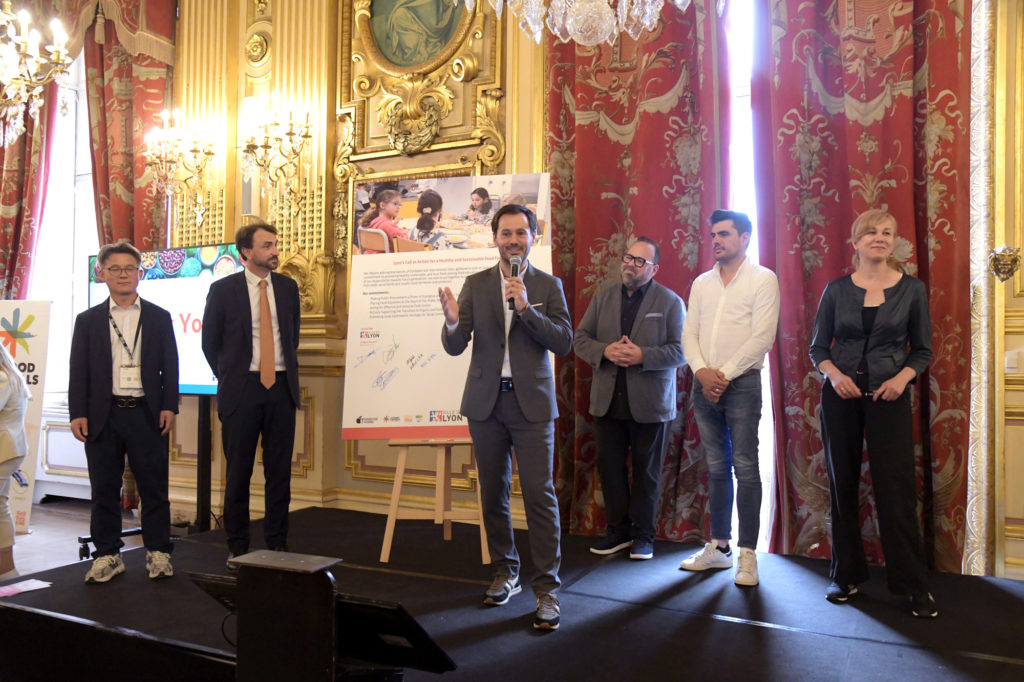
Day Three
The final day of our general Assembly started at the CIRC Center, where researchers unpacked the link between nutrition and health, namely cancer prevention, demonstrating how dietary habits can be pivotal for long-term public health.
In the following sessions, our partners received important updates on the development of the Health Impact Assessment developed by the University of Alcalá, and the Environmental Impact Calculator developed by Fondazione Ecosistemi, which will soon become a practical resource for cities with the ambition to to improve their (school) food.




The SF4C General Assembly closed on Friday afternoon with two more field visits for our project partners: The first group visited La Légumerie, a local association that hosts collective gardening activities and cooking workshops. The association welcomed the partners at the community garden L’Oasis de Gerland, and they exchanged insights about their many initiatives and projects.
The second group had the opportunity to visit Lyon’s food centre, which includes a social restaurant, supermarket, and kitchen facilities.
This centre supports people in financial difficulties, for example by providing its supermarket customers with a loyalty card, which customers can use to anonymously pay adjusted prices for the products in its range, depending on their individual financial situation.
This mechanism allows people to access affordable meals and groceries, and even allows them to cook on-site, thanks to the facility´s shared kitchen.
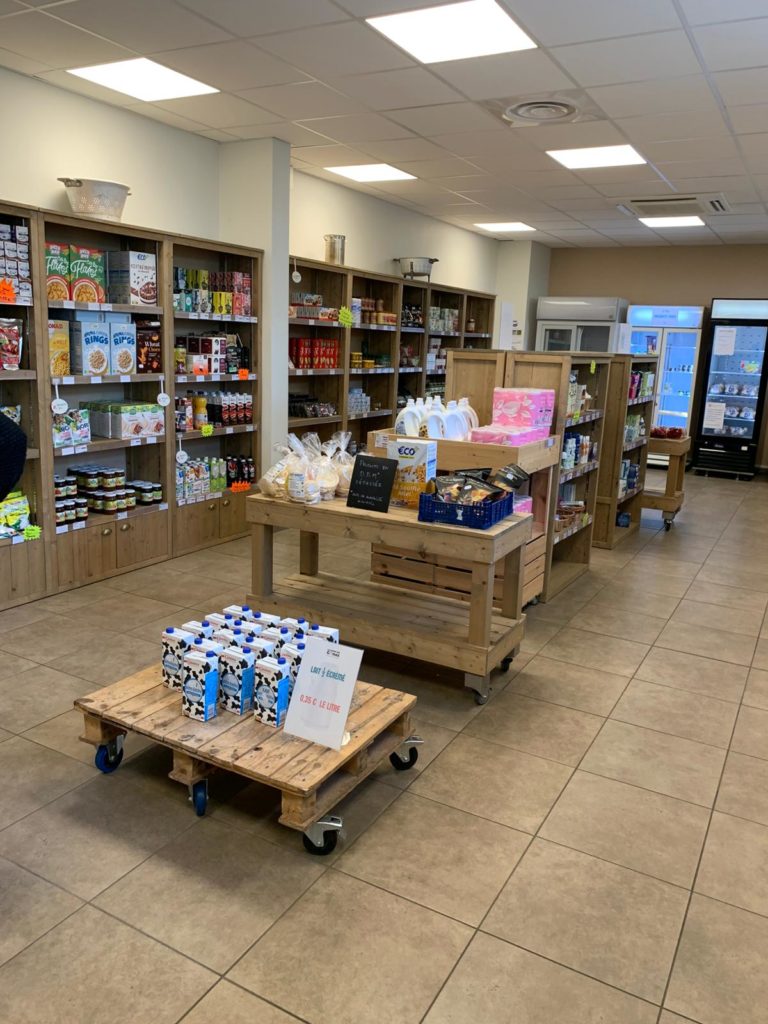
Looking Ahead: Impact Measured, Momentum Gained
So, what do we take back to our offices, to our desks, in terms of inspiration, motivation and new ideas?
During the three intensive days, one thing became very clear: our SchoolFood4Change way of doing things works. Now entering its final year, the SchoolFood4Change project is already leaving a lasting legacy. Across 22 countries, 3,262 schools have been reached, directly impacting more than 850,000 people within the broader school communities. Through multiplier training, over 6,000 individuals—including 1,400 canteen staff—have gained new skills and learned useful cooking practices to improve school menus. 89 „Canteen Days„, hosted by schools, have mobilized nearly 17,000 people, while sensory testing sessions engaged thousands more in co-creating recipes that resonate with children and that can be added to the menus, improving the pupils‘ nutrition in a playful and natural way.
Through cascade effects, the project has potentially influenced over 2.9 million people through our activities and the passing on of knowledge from community member to community member. These numbers represent a SchoolFood4Change movement that aims to reshape how food is sourced, cooked, and valued in educational spaces.
In Lyon, the participants’ motivating energy was undeniable. And the shared message was clear: Food isn’t just about what’s on the plate. It’s about justice, health, sustainability—and the future we choose to nourish.
If you would like to see more pictures, and get even more insights into this great event? Follow this link to our SchoolFood4Change Instagram page!

